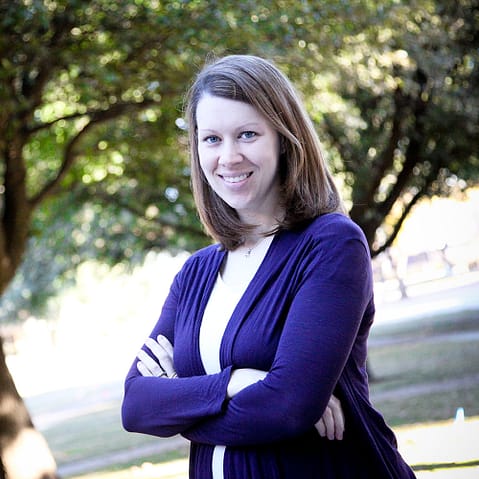
Dr. Rebecca Hunter, associate professor of biology, has traveled to many places in her search for learning, including the deep waters of the Antarctic.
She spent four months on a research vessel in the Southern Ocean, earned a master’s degree in wildlife and fishery sciences and a Ph.D. in biological sciences, and did research on bait shrimp found along the Gulf Coast.
But when it came to choosing a place to start a career and settle her family, Rebecca decided to come back to the place where it all started: ACU.
“For me, coming to ACU was coming home,” she says. “I always knew I wanted to teach at a smaller university after getting my Ph.D., and God pretty much led me here with a job opening at exactly the right time.” She joined the ACU faculty in 2009.
Her experiences as a graduate student have served her well as she has begun teaching her students about the possibilities inherent in research. As a Ph.D. student at Auburn University, she participated in a research program studying Antarctic marine invertebrate population genetics. Rebecca and her research partners worked together to collect a large variety of seastars, sea spiders, worms and mollusks from the ocean floor surrounding Antarctica and analyzed how the biological factors in the region affected genetic patterns and levels of biodiversity.
“I really enjoyed my research as a Ph.D. student, but especially enjoyed the opportunity to see first-hand the bizarre life forms found in the deep, dark Antarctic waters, many of which are found nowhere else in the world,” she says.
Delving deeper
Rebecca uses the sense of wonder she developed on that research project to inspire her students to look deeper into the subjects they’re studying. In her classes, which include biology, marine biology, anatomy and physiology, she emphasizes the importance of dedication to academics and personal discipline. “In the biology department, we strive to make our students work harder, become more disciplined, and learn more than they ever thought possible. We feel very committed to preparing them for what is ahead, whether that be medical school, graduate school, or a host of other possibilities,” she says.
The work ethic and sense of compassion shown her students impress her daily, she says. “I have greatly appreciated the opportunity to teach smaller classes where I can actually get to know and interact with my students,” she says. “There is just something different about ACU students. They work harder, are more genuine and caring, and are more purpose-driven.”
Engaging questions
One of her favorite moments of being a professor is when students become so engaged in the material that they start asking questions that even she can’t answer. “I love when students ask questions in class,” she says. “I don’t always know the answers, but I appreciate that they are thinking about and interested in something beyond what I am teaching at that particular moment. It is great when they teach me things!”
Another favorite moment for Rebecca is when she’s able to engage a student in research outside of class. Her most recent project involved studying a common bait shrimp found in the Gulf Coast region, partnering with ACU undergraduate Amber Deschamps. She is also involved in a National Science Foundation research project, in which, along with several other collaborators, she will study the developmental biology of a large group of marine invertebrates known as the echinoderms (seastars and their relatives).
“I think we do a great job of providing unique experiences for our undergrads,” she says.
“They have opportunities to participate in summer medical missions, serve as lab teaching assistants, carry out research with faculty, and take summer field courses.”
ACU’s emphasis on undergraduate research and its commitment to engaging students on every level of their lives is part of Rebecca’s desire to share her love of learning with others. As an ACU graduate and now an ACU professor, she knows the importance of connecting with students and challenging them to meet their full potential. And so when she gives one last bit of advice to future biology students at ACU, her words are well-considered and imbued with the wisdom of experience.
“Be prepared to work hard, but know that you will be challenged – and fascinated.”
